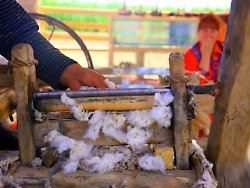Thursday, December 03, 2020
Do not tolerate "slave labor"
USA stop importing Uyghur cotton
Human rights organizations have long accused China of brutally suppressing and imprisoning the Uighur minority. The US does not want to accept this any longer – it is stopping the import of cotton from the Xinjiang region – a step towards a complete import boycott of the region.
The US stops importing cotton from the Xinjiang region of China because of human rights violations. The "slave labor" in the cotton fields in the Uighur province will no longer be tolerated, said a representative of the US government. Beijing accused Washington of spreading fake news.
"The human rights abuses committed under the Chinese communist government will not be tolerated by President Trump and the American people," said Ken Cuccinelli of the US Department of Homeland Security. Those who violate human rights, including US companies, should not "manipulate our system" and "benefit from slave labor," Cuccinelli said. Under the new regulation, US customs and border protection authorities can fix cotton shipments from Xinjiang.
The US accuses China of systematic and brutal suppression of the Muslim Uyghur minority in Xinjiang. According to human rights organizations, more than a million Uyghurs and other Muslims are detained in detention camps in the province. Many of them would have to do forced labor.
Beijing reacted angrily to the American allegations. Washington spread "false news about so-called forced labor," said Chinese Foreign Ministry spokeswoman Hua Chunying. The US intended to "restrict and suppress relevant companies in China and to slow down the development of China".
Xinjiang is a global hub for the sale of cotton. According to one study, it is estimated that around a fifth of clothes imported into the US contain at least some yarn from the Chinese region. The US House of Representatives decided almost unanimously in September to generally ban all imports from Xinjiang, but the bill has yet to be passed by the Senate.
.
